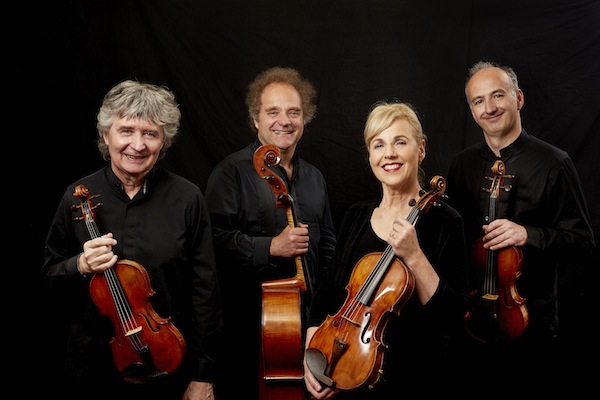Takács Quartet brings elegance and electricity to Boston concert
If it doesn’t breed contempt, as the saying suggests, familiarity can be an awfully good thing.
Take the Takács Quartet. Currently in its 43rd season, the ensemble’s membership has changed over the decades. Violinist Károly Schranz and cellist András Fejér are the sole remaining members of the original foursome. (Schranz is retiring next month and violinist Harumi Rhodes will take his place.) Accordingly, the group’s playing is marked by a sense of accomplishment and comfortability that only many years in close community can beget.
Those qualities shouldn’t be confused for complacency, though, as the quartet’s concert proved Friday night at Jordan Hall, courtesy of the Celebrity Series. Yes, it was often elegant in tone and execution. But it always pulsed with electricity and character.
This was evident from the opening bars of Mozart’s G-major Quartet, K. 387. The first of six quartets dedicated to Haydn, the piece channels many of the older composer’s trademark gestures through the younger one’s voice.
Friday’s performance teemed with energy and intensity, the Takács exaggerating the first movement’s dynamic contrasts and drawing out the whimsy behind the Minuet’s chromatic hemiolas and irregular phrases. Edward Dusinberre’s account of the slow movement’s aria-like first violin line was incandescent and the contrapuntal rigors of the finale spoke with plenty of wit, especially the movement’s abupt, surprising coda.
After the straightforward charm of the Mozart came Shostakovich’s runic String Quartet no. 11.
Written in 1966 for the Beethoven Quartet, it is, like most of the music from Shostakovich’s last decade, dark and brooding. Its sense of mystery is compounded by the aphoristic quality of its seven brief movements, all of which bear titles familiar from the Classical and Romantic eras.
On Friday, the Takács played the spare gestures of the Introduction and Finale with detached clarity. The aggressive passages – the Recitative’s savage dissonances, the Etude’s devilish bravura – burned hot. And the score’s epic Elegy and ironic Scherzo and Humoresque moments were, respectively, noble and droll. Throughout, the ensemble effectively drew out the music’s rich palette of colors and effects, particularly its various employments of glissandi.
After intermission came the night’s largest offering, Beethoven’s String Quartet no. 14, op. 131.
The C-sharp-minor quartet is one of Beethoven’s most visionary compositions. The four-movement work is prefaced by a fugue and filled in with commentary in the form of two additional, transitional movements. Expressively, it runs the gamut from the profound to the earthy and back again; in the central set of variations, the sublime and the commonplace coexist in extraordinary harmony.
Friday’s reading reveled in the music’s play of contrasts and personalities. Its opening fugue was smooth-textured and, while taken at a true Adagio ma non troppo, eloquently paced. The fluid second movement was suitably jaunty and the short third quizzical.
Its central Andante ma non troppo brought out some of the finest playing of the evening: plucky articulations of the movement’s many canonic figures, sleekly dovetailed gestures, and passionate lyricism across the group. Cellist Fejér’s interjections in its fourth variation were particularly spunky.
To conclude the work, the Takács emphasized the stark, expressive distance between the rustic jollity of the Scherzo (realized with lots of vigor) and the strict sobriety of the finale, its reprise of snatches from the opening fugue peeking ominously through. Their account of the ruminative Adagio that comes in between was conspicuously direct.
Afterwards, Friday’s audience brought the group back for multiple bows. They gave no encores, but none were needed: Beethoven’s word, on this night at least, was the ultimate one.
